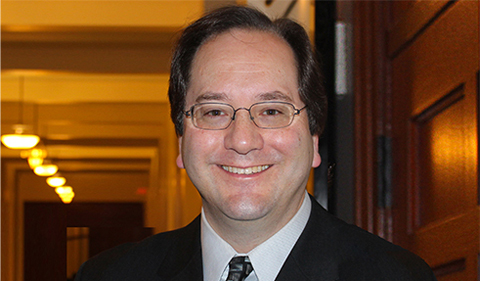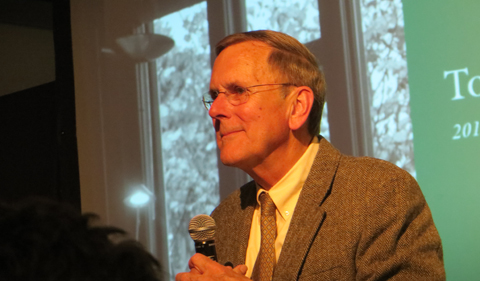By Sierra Heilman
Dr. Fred Drogula, the new director of the Charles J. Ping Institute for the Teaching of the Humanities, wants to champion the humanities and challenge his students to “put ourselves in (ancient people’s) shoes…or sandals” to understand their ideas and culture.
Drogula is also a professor in the Classics & World Religions Department. He earned a Ph.D. from the University of Virginia following two M.A. degrees from Boston University and University of Virginia and a B.A. from Kenyon College.
Furthering OHIO’s Mission
It’s not every day that you find a professor like Fred Drogula. He has close ties to Ohio, having moved to the state twice previously, and it’s no surprise that Ohio called him back for a third time—and this time to become a Bobcat. He believes there is no place like a college town, with its rich intellectual activity and shared sense of purpose. The heart of OHIO and the vibe of this special college town were only two of the many reasons that drew him to make a home in Athens with Ohio University.
After discovering the exceptional Classics & World Religions Department, he knew he wanted to join the department and make a difference by furthering the mission of this university. Drogula emphasized his love for teaching and for the humanities, explaining that he is moved by his passion to teach.
“I wake up every day and I am excited to come to work. I have so much fun and I love getting these discussions going. How many people have a job that they love so much?” he said.
Championing the Teaching of Humanities
A very special part of his job and one of his main duties is to run the Ping Institute for the Humanities. Distinct from the Charles J. Ping Center, the Ping Institute is a group of five to six professors that strive to “champion the teaching of the humanities.”
As he takes on this role he hopes to bring a better understanding and appreciation of the humanities to the university and to Ohio high schools. Those chosen to be a part of this institute want to share their passion for teaching the humanities through their various interactive workshops and speakers that they bring to the university each year.
“It’s a chance for these teachers and professors to reconnect with being a student again, and to engage in serious discussions of why the humanities are so important to living a full and rewarding life. We explore how the humanities connect to every aspect of intellectual study.”
One of their goals to is getting people to move away from the misconception that the humanities are not job-oriented fields.
“For over two thousand years, the education of leaders in western society has been grounded in humanities. It trains you to read, write, think, and argue critically, and helps you understand different people and ideas. It actually enables you to do most every job, because it prepares you to think creatively and outside-of-the-box, a characteristic of all successful leaders,” Drogula states.
What is taught in humanities courses are things that we think about daily, and that add value and meaning to our lives. What is the meaning of life? What are we put on this earth to do? What does it mean to live a happy and purposeful life? What does it mean to live well? It dates back to ancient Greece and Rome, and these questions still arise today. What is so interesting about Drogula’s classes is that he will challenge you to think critically about these types of questions and get you to understand people who are radically different from you. The things that you read, analyze, and talk about are training you to grow smarter and more capable of thinking and arguing critically about everything.
Making a ‘Great’ Impact on Students This Fall
Currently, Drogula is teaching a course called Alexander the Great and the Hellenistic World, and another called Human Aspirations among the Greeks and Romans. These two courses are full of amazing information that he shared with me.
He focuses on Alexander the Great as a titanic figure that changed the course of history. In this class, students talk about the impact and consequences of what Alexander the Great represents and how he is remembered in many different kinds of literature and cultures.
“It’s like a stone thrown in a pond—the reverberations of his career echo through history and culture,” Drogula says. By this, he means Alexander’s influence has been passed down throughout history and touches our lives in ways we may not realize.
He believes these are important issues to study—and relevant for all university students—because they get at the foundations of our society and the way we perceive the past. He notes that “what is remembered is not always accurate,” but he points out that the way humans remember great figures of the past tells us a great deal about the norms and values of our own society, even if (and especially if) their memory of the past is not quite accurate.
Thinking critically and improving one’s analytical and argumentative writing is what is expected in this course. He stresses that reading this kind of literature challenges you to read and think more critically and helps you learn to handle different things in the future.
In his course Aspirations among the Greeks and Romans, Drogula says, “It surprises people when they find out that, for the past two and a half millennia, people have worried about the same things we worry about today, such as the nature and purpose of our soul—do we have one, and what does it do and what is it for? What is love, and how does it have a place in our life? What do humans want for themselves? What gives life meaning, why are we here, and how do we live a happy and fulfilling life?”
This class explores why these questions have stayed in the minds of people throughout time.
“We have to put ourselves in their shoes…or sandals…to understand these ancient people’s ideas and culture, and realize that human concerns have remained remarkably consistent throughout time. If you can learn to understand and connect with an ancient civilization, you can learn anything!”
He confidently said, “Students always rise to the challenge! They show up with challenges, questions, and deep concerns. They catch me off-guard with insightful questions. The students are doing fantastic because they are interested in these profound questions.”
Uncovering Ancient Athens
In the spring, he will be teaching two courses; Classical Athens, and Women in the Ancient Mediterranean. Drogula gave a sneak peek into what these classes entail, and I hope everyone gets the chance to take these courses because they sound beyond intriguing.
Classical Athens takes an intensive look at the ancient city of Athens, Greece as an urban culture in as many different ways as possible; history, literature, art, architecture, archaeology, public spaces, political and religious spaces, location and organization, and more. It is an intensive study of one of the oldest and most famous spaces in the western world, which has had an awesome influence on the history of western cultures.
It’s one of the oldest cities in the world, 3,000-years-old at least, that has collapsed, been reborn and surged, and decayed and collapsed only to arise again. You’ll learn how this city has developed and changed over time as well as how this city tells its own story. “If anyone is interested in going to Athens, Greece, or understanding its pivotal place in human history, take this course!” Drogula encourages.
The course Women in Ancient Mediterranean teaches us about women in this time and how they were underrepresented in nearly every way. They weren’t even considered citizens and the purpose of this class is to recover the best we can about women at this time.
“It is difficult because all of the literature was written by men and for men, and very little of it was about women or even thought about women.” You’ll learn to uncover what roles women had in society and what roles they couldn’t play. This requires making extensive use of archaeology and careful readings of other sources to uncover the important-yet-silenced roles these women played. You’ll also dig into existing literature and archaeological evidence, but learn to filter the masculine perspective and seek evidence for the lives and activities of women, which helps us look at the ancient world in a different way.
Sparking Conversation Around the World
In Drogula’s latest book, forthcoming in 2019, Cato the Younger: A Life at the Collapse of the Roman Republic, he examines the life and career of Cato and argues that he played a crucial and previously underappreciated role in bringing about the collapse of the Republican government he sought to protect.
“It breaks down the concepts of tradition and moral authority to understand how a figure like Cato could be so important and stand toe-to-toe with Julius Caesar,” he explained. “Caesar had legions and wealth and power, but Cato was nevertheless able to rally support among the Roman Senate and people to oppose Caesar’s ambitions, which reveals the ways the Roman politics worked behind-the-scenes.
His book, Commanders and Command in the Roman Republic and Early Empire was published 2015. This book focuses on intellectual history, studying the origins and development of western thinking about the concepts of authority, specifically military authority. Where did the idea of military authority come, what did it originally mean, and how did it develop? How did the western world develop its concepts of military command and authority? He explains the development of these concepts and shows how they have developed into our world now.
It also reconsiders the development of early Rome.
“The common folklore of the origins of the Roman state is probably wrong and using a range of other types of historical information, as well as critical readings of existing literature, I try to offer a reconstruction of how Rome developed in its early centuries. What we know is based off of assumptions, myths, and folklore, and received tradition. In order to learn more and recover Rome’s early past, we have to look at things in new and more critical ways; we have to learn how to critique the work of ancient writers,” he says.
Drogula has also been invited to multiple talks across the world. He’s been invited to give papers in many US states, as well as in England, Germany, Spain, and New Zealand. His ideas from his first book caught people’s attention and he loves being able to go to new places to share his ideas with others.
“It’s one of the exciting elements of being a professor. By sharing my ideas and having people question them, it’s like being a student again.”
“It’s also a critical part of being a professor. Presenting your ideas and taking the feedback—good or bad—is so helpful. It’s the whole essence of humanities—learning to make better, clearer, and stronger arguments.”




















Comments